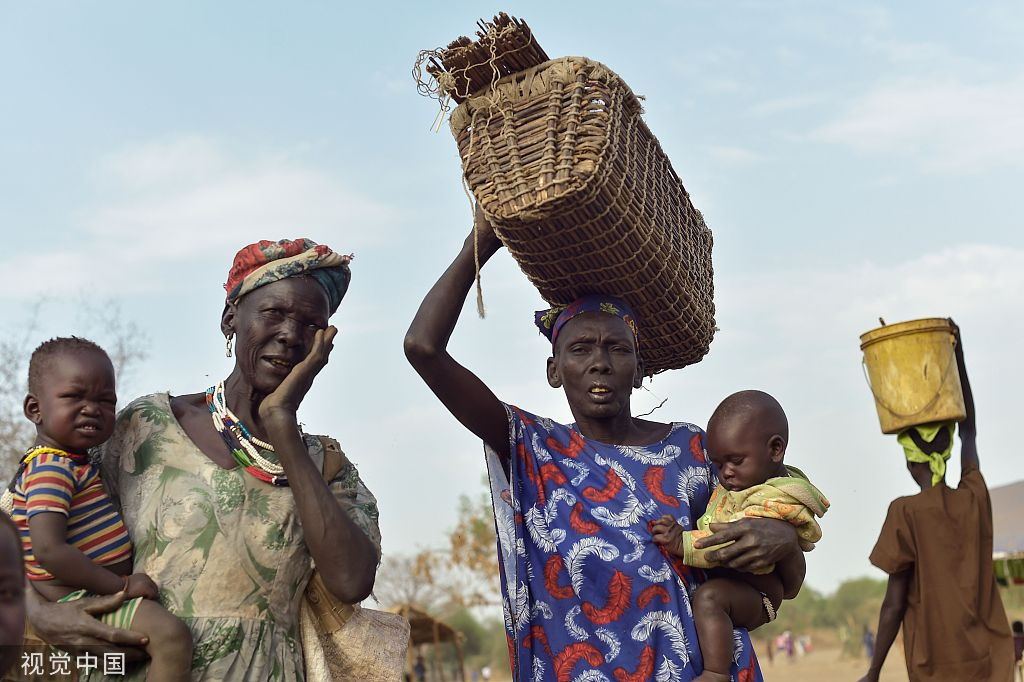
Women carrying children at a market in Udier town, South Sudan, on March 7, 2019. (Photo: VCG)
Action Against Hunger, a global humanitarian organization committed to ending world hunger, has called on the international community to collectively make political commitments and take action to avoid a hunger crisis in light of the coronavirus pandemic.
The organization said along with previous experiences, the direct and indirect impacts of novel coronavirus on health, hunger and food insecurity are already extensive.
"With 40 years of experience fighting hunger in many countries, Action Against Hunger has long understood the impact of large-scale emergencies, witnessing the Ebola outbreak, war-torn countries, and extensive displacements. This pandemic is however unique, its sheer magnitude differentiating it from other crises," the organization said.
The humanitarian organization said coronavirus impacts are multiple and massive, varying from one region to another, depending on rural or urban localization, as well as food availability and access. Responses therefore need to be comprehensive and adapted to each context.
To implement an effective response, Action Against Hunger said humanitarian and development actors must work alongside communities and civil society organizations to jointly define both the needs and the appropriate response.
Africa is already grappling with food security challenges with the situation in the East African region having been worsened by locust infestation that has destroyed crops and the livelihoods of millions of smallholder farmers.
The World Food Program estimated 20 million people already faced acute food insecurity in nine countries before the coronavirus outbreak.
According the World Economic Forum, about one in five of the world's acutely food-insecure people are in the Intergovernmental Authority on Development region, an area of 5.2 million square kilometers that comprises Djibouti, Eritrea, Ethiopia, Kenya, Somalia, South Sudan, Sudan and Uganda.
While weather extremes were the primary cause in 2019, the organization said most of the countries are vulnerable to conflict, insecurity and economic shocks.
In June, Oxfam International, a global movement of people working to end the injustice of poverty, warned that 40 million people in southern Africa were at risk of increased hunger and poverty due to the double threat of the coronavirus and consecutive climatic shocks.
It said more than 17 million people across Malawi, Mozambique, Zimbabwe, Zambia, and South Africa are already food insecure due to last year's drought.
Additionally, about 40 percent of the region's population are already living in abject poverty, as the World Food Program warns that food prices are at a five-year high.
Meanwhile, in the past months, Action Against Hunger program and teams in over 40 countries worldwide have been actively working to contain the spread of the virus.
They have been providing direct support to affected people while continuing responses to ongoing crises. They also have been supporting people, communities and local authorities to prevent further suffering, as well as building more resilient health, food, and social protection systems.
"We must use this crisis as an opportunity to strengthen these systems, to prevent future outbreaks and hunger crises," Action Against Hunger said.
"Promoting adequate access to basic water and sanitation services, mental health and protection, building universal health coverage, (and) reaffirming our commitment to principled humanitarian actions" are among its other goals.
"This is in addition to transforming food systems and security policies to improve our resilience to ongoing and future shocks must also be prioritized," the organization added.


